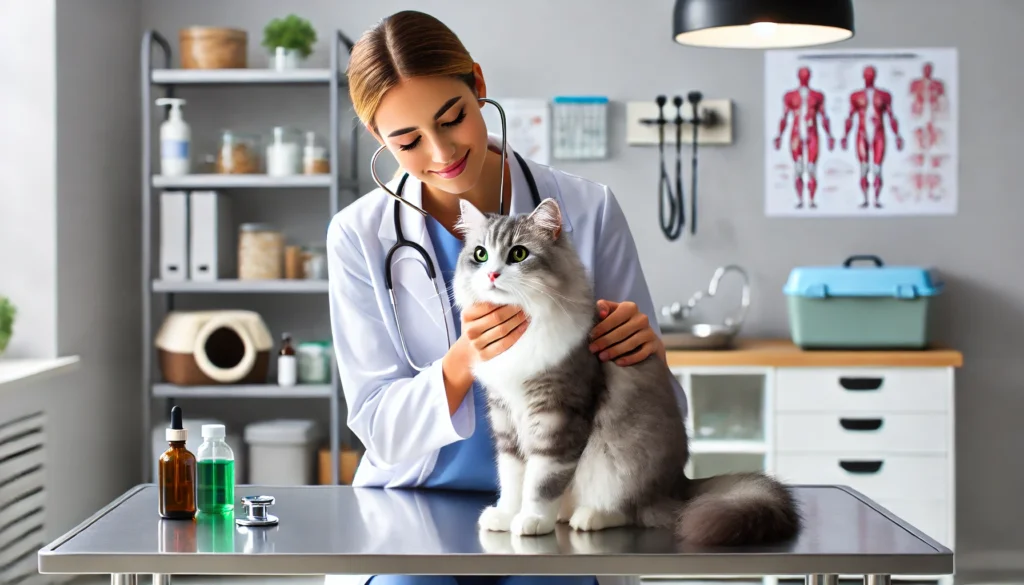Cats are often seen as independent and low-maintenance pets, but like all animals, they require regular health care to ensure they live long, healthy lives. One of the most important aspects of cat care is the annual veterinary check-up. These yearly visits to the vet are crucial for detecting health issues early, providing preventive care, and ensuring your feline friend is in optimal health. This article will explore the importance of annual vet check-ups for cats, what to expect during these visits, and how they contribute to your cat’s overall well-being.
Why Annual Vet Check-ups Are Essential for Cats
1. Early Detection of Health Issues
One of the primary reasons for annual vet check-ups is the early detection of health problems. Cats are known for hiding signs of illness, making it difficult for even the most attentive owners to notice when something is wrong. During an annual exam, the veterinarian can identify subtle signs of health issues that may not be apparent at home.
- Common Hidden Health Problems: Conditions such as dental disease, kidney disease, diabetes, and hyperthyroidism are common in cats, especially as they age. These conditions often show few or no symptoms in the early stages, but a vet can detect them through physical exams, blood tests, and urine tests.
- Early Intervention: Detecting health issues early allows for prompt treatment, which can prevent the condition from worsening and improve the prognosis. For example, early detection of kidney disease can lead to dietary changes and medication that can slow the disease’s progression.
2. Vaccinations and Preventive Care
Annual check-ups are the perfect opportunity to ensure your cat is up-to-date on vaccinations and other preventive care measures. Vaccinations protect your cat from various infectious diseases, some of which can be life-threatening.
- Core Vaccinations: These include vaccines for feline panleukopenia (distemper), feline calicivirus, feline herpesvirus, and rabies. These are essential for all cats, regardless of whether they are indoor or outdoor pets.
- Non-core Vaccinations: Depending on your cat’s lifestyle and risk factors, your vet may recommend additional vaccines, such as those for feline leukemia virus (FeLV) or Bordetella.
- Parasite Prevention: Vets will also discuss and provide treatments for parasites such as fleas, ticks, and worms. Even indoor cats can be exposed to these parasites, so regular preventive treatments are important.
3. Dental Health
Dental disease is one of the most common health issues in cats, and it can lead to serious problems if left untreated. During an annual check-up, the vet will examine your cat’s teeth and gums to check for signs of dental disease, such as tartar buildup, gingivitis, and tooth decay.
- Dental Cleanings: If necessary, the vet may recommend a professional dental cleaning, which involves removing tartar and plaque buildup under anesthesia. This can prevent more serious issues, such as tooth loss or infections that could spread to other parts of the body.
- Home Dental Care: The vet can also provide advice on maintaining your cat’s dental health at home, such as brushing their teeth or using dental treats.
4. Weight Management and Nutrition
Obesity is a growing concern in cats and can lead to a range of health issues, including diabetes, arthritis, and heart disease. During an annual check-up, the vet will assess your cat’s weight and body condition to determine if they are at a healthy weight.
- Dietary Recommendations: If your cat is overweight, the vet can provide recommendations for weight management, including dietary changes and exercise routines. Conversely, if your cat is underweight or has specific dietary needs, the vet can suggest appropriate food and supplements.
- Monitoring Changes: Regular check-ups allow for monitoring changes in weight and diet over time, ensuring that your cat remains in good health as they age.
5. Senior Cat Care
As cats age, their health care needs change. Senior cats (typically those over 7 years old) are more prone to chronic conditions, and regular vet visits become even more critical.
- Senior Cat Screenings: Vets often recommend additional tests for senior cats, such as bloodwork, urine analysis, and blood pressure checks, to screen for common age-related conditions like kidney disease, hyperthyroidism, and arthritis.
- Quality of Life: Regular check-ups help ensure that senior cats maintain a good quality of life. The vet can provide advice on managing chronic conditions, pain relief, and adjusting care routines to meet the needs of an aging cat.
6. Behavioral and Environmental Advice
Behavioral issues can be a sign of underlying health problems or environmental stressors. During an annual check-up, the vet can discuss any behavioral changes you’ve noticed in your cat and offer advice on how to address them.
- Common Behavioral Issues: Problems such as litter box avoidance, aggression, or excessive grooming may be linked to medical issues or changes in your cat’s environment.
- Environmental Enrichment: The vet can suggest ways to enrich your cat’s environment to reduce stress and prevent behavioral problems. This may include providing more playtime, introducing new toys, or making changes to your home layout.
What to Expect During an Annual Vet Check-up
Understanding what happens during an annual vet check-up can help you prepare and ensure that your cat receives comprehensive care. Here’s a breakdown of the typical components of a check-up:
1. Physical Examination
The vet will perform a thorough physical examination, which includes checking your cat’s:
- Eyes and Ears: To look for signs of infection, discharge, or abnormalities.
- Mouth and Teeth: To assess dental health and check for signs of gum disease, tartar buildup, or other oral issues.
- Skin and Coat: To identify any skin conditions, parasites, or lumps.
- Heart and Lungs: To listen for any irregularities in heart rate or breathing.
- Abdomen: To feel for any unusual masses or tenderness.
- Joints and Limbs: To check for signs of arthritis or injury.
2. Vaccinations and Preventive Care
The vet will review your cat’s vaccination record and administer any necessary vaccines. They will also discuss and recommend preventive treatments for parasites, such as flea and tick preventatives, heartworm prevention, and deworming.
3. Diagnostic Tests
Depending on your cat’s age, health history, and any concerns you have, the vet may recommend diagnostic tests, such as:
- Bloodwork: To check for underlying health conditions like kidney disease, diabetes, or hyperthyroidism.
- Urine Analysis: To assess kidney function and check for urinary tract infections or other issues.
- Fecal Exam: To detect parasites or other gastrointestinal issues.
4. Weight and Diet Assessment
The vet will weigh your cat and assess their body condition score (BCS). They will discuss your cat’s diet and make recommendations for any necessary changes to ensure your cat is receiving proper nutrition.
5. Behavioral Consultation
If you have noticed any changes in your cat’s behavior, such as increased aggression, litter box issues, or changes in appetite, the vet can help identify potential causes and offer solutions.
6. Discussion and Education
The vet will take the time to answer any questions you have about your cat’s health, behavior, or care. They may also provide educational materials on topics like dental care, weight management, and senior cat care.
The Long-term Benefits of Regular Vet Visits
Regular vet check-ups provide long-term benefits for your cat’s health and well-being. Here’s how these visits contribute to a healthier, happier life for your feline friend:
1. Improved Quality of Life
By addressing health issues early and providing preventive care, regular vet visits help ensure that your cat enjoys a higher quality of life. This means fewer illnesses, less pain, and more energy to engage in daily activities.
2. Extended Lifespan
Cats that receive regular veterinary care are more likely to live longer, healthier lives. Early detection and treatment of conditions can prevent them from becoming serious and life-threatening.
3. Peace of Mind for Pet Owners
Knowing that your cat is receiving regular check-ups and preventive care provides peace of mind. You can be confident that you’re doing everything possible to keep your cat healthy and happy.
4. Strengthened Bond with Your Cat
Taking your cat to the vet regularly and staying on top of their health needs strengthens the bond between you and your pet. A healthy cat is a happier, more affectionate companion.
Overcoming Common Barriers to Regular Vet Visits
Despite the importance of annual check-ups, many cat owners face challenges in bringing their cats to the vet regularly. Here are some common barriers and tips for overcoming them:
1. Cost Concerns
Veterinary care can be expensive, but the cost of preventive care is often lower than the cost of treating advanced health problems. Consider pet insurance, which can help cover the cost of routine check-ups and unexpected medical expenses.
2. Stressful Visits
Many cats find vet visits stressful, which can make owners hesitant to schedule regular appointments. To reduce stress:
- Acclimate Your Cat to the Carrier: Leave the carrier out in your home with the door open so your cat can explore it at their own pace. Place treats or toys inside to create positive associations.
- Use Feline Pheromones: Spraying the carrier with a synthetic feline pheromone can help calm your cat during the trip to the vet.
- Schedule a Calm Time: Try to schedule vet visits during a time when the clinic is less busy, which can reduce the stress of a noisy, crowded environment.
3. Difficulty Transporting Cats
Transporting a cat can be challenging, especially if they are not accustomed to car rides. Here are some tips:
- Gradual Desensitization: Gradually get your cat used to car rides by taking them on short trips in their carrier, increasing the distance over time. Reward them with treats to create a positive experience.
- Comfortable Carrier: Ensure the carrier is comfortable, with soft bedding and proper ventilation. Covering the carrier with a blanket can help reduce anxiety by blocking out visual stimuli.
4. Time Constraints
Busy schedules can make it difficult to find time for vet visits. However, prioritizing your cat’s health is essential:
- Plan Ahead: Schedule appointments well in advance and choose a time that fits your routine. Many vets offer early morning or evening appointments to accommodate different schedules.
- Combine Appointments: If you have multiple pets, try to schedule their check-ups together to save time.
5. Perceived Lack of Necessity
Some owners may believe that indoor cats or seemingly healthy cats don’t need regular vet visits. However, this is a misconception:
- Indoor Cats: Even indoor cats can develop health issues that require veterinary care, such as dental disease, obesity, or urinary tract problems. Regular check-ups are crucial for early detection.
- Healthy Cats: Annual check-ups are preventive measures that help maintain health and catch problems before they become serious. Even if your cat appears healthy, regular vet visits are essential for long-term well-being.
Conclusion
Annual vet check-ups are a vital component of responsible cat ownership. These visits allow for the early detection of health issues, the administration of necessary vaccinations, the maintenance of dental and overall health, and the provision of valuable behavioral and nutritional advice. By prioritizing these yearly appointments, you are taking proactive steps to ensure that your cat enjoys a long, healthy, and happy life. Overcoming common barriers to regular vet visits, such as cost concerns or stress, is crucial in providing the best care for your feline friend. Remember, a healthy cat is a happy cat, and regular veterinary care is key to achieving that goal.
Frequently Asked Questions
Why are annual vet check-ups important for my cat?
Annual vet check-ups are crucial because they allow for the early detection of health issues, ensure your cat is up-to-date on vaccinations, and provide preventive care. Regular visits help maintain your cat’s overall health and can catch problems before they become serious.
What happens during a typical annual vet check-up for cats?
During a typical check-up, the vet will conduct a thorough physical examination, administer any necessary vaccinations, and discuss preventive care such as flea, tick, and worm treatments. The vet may also perform diagnostic tests like bloodwork or a urine analysis to check for underlying health issues.
How do I prepare my cat for a vet visit?
To prepare your cat, start by getting them used to their carrier. Leave the carrier out at home with the door open, placing treats and familiar bedding inside to create a positive association. Using calming pheromone sprays can also help reduce anxiety during the trip to the vet.
What are the most common health issues that vets look for in cats during check-ups?
Common issues include dental disease, obesity, kidney disease, hyperthyroidism, and diabetes. Vets also check for signs of parasites, infections, and behavioral changes that could indicate underlying health problems.
Are vaccinations necessary for indoor cats?
Yes, vaccinations are necessary for indoor cats. Even though they are less exposed to outside dangers, they can still contract diseases through contact with humans, other pets, or even from wildlife entering your home. Core vaccinations protect against severe and potentially life-threatening illnesses.
How often should senior cats visit the vet?
Senior cats, typically those over seven years old, should visit the vet at least once a year, but bi-annual visits are often recommended. These visits are crucial for monitoring age-related conditions like arthritis, kidney disease, and thyroid issues, allowing for early intervention and better management.


